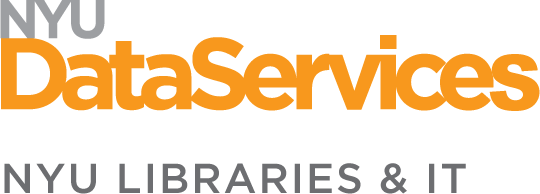
For assistance, please submit a request.
You can also reach us via the chat below, email data.services@nyu.edu, or join Discord server.
If you've met with us before, tell us how we're doing.
Stay in touch by signing up for our Data Services newsletter.
Bobst Library, 5th floor
Mondays: 10am - 5pm
Tuesdays: 10am - 5pm
Wednesdays: 10am - 5pm
Thursdays: 10am - 5pm
Fridays: 10am - 5pm
Social Media Research Overview
Research on social media platforms has become common in a variety of disciplines in the social sciences and humanities. This guide is a collection of resources about the variety of methods, tools, and techniques used by the interdisciplinary community conducting research of online spaces. By necessity, this community harnesses methods and techniques that span beyond the normal scope of qualitative research, however, many of the analytical principles align with those of qualitative inquiry.
If you are looking for assistance with this type of research, please use the form below.
"Investigative Digital Ethnography combines elements of investigative journalism with ethnographic observation in a practice useful for academic researchers, policy makers, and the press. It is a particularly useful method for understanding disinformation campaigns. By taking the long-form approach of an investigation, this method may follow breaking news, or be used to analyze a specific case after the immediate event is over. The researcher is ideally tracking one central topic or case and may discover additional components as the investigation progresses. At some point, the gathering of information must end and the ethnographer must move on to analysis.
The ethnographic method situates people in spaces marked by distinct rituals, beliefs, and cultural production. An ethnographer engages with the subjects to varying degrees, and in the case of digital ethnography, with the traces they leave behind. Observing online communities properly takes time, and the ethnographic process requires a commitment to observation during breaking news events and also during the downtime in between.
This investigative ethnographic method merges the pointed search for specific information that defines journalistic and legal investigation, with the long-term observation that defines ethnography. While an individual investigation may lead to one output in the form of an article, a long-term ethnography composed of many investigations can reveal valuable hidden details that may not have been significant to a single investigation." - Friedberg, “Investigative Digital Ethnography.”
Open Sources Intelligence/ Investigations, refers broadly to any type of research or investigation that can legally be collected for readily available public information. For many researchers and practitioners this primarily means online sources such as social media, blogs, etc., however this can include any source of publicly available information. Often, OSINT requires the blending of a variety of disciplinary methods from computer science, journalism, sociology, law etc. and is used widely to document abuses of human rights, monitor disinformation campaigns, study and promote social justice and accountability. Below are resources and tutorials to provide an introduction to OSINT tools and methods.